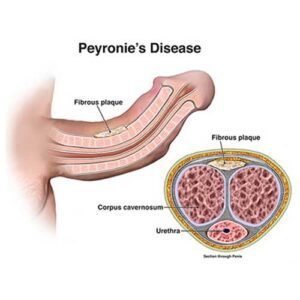Welcome to wilkilfestyles.com :
Introduction :Peyronie’s Disease Understanding Remedies and FAQs
Topics Covering “Peyronie’s Disease remedies” “Peyronie’s Disease treatment options” “Managing Peyronie’s Disease” “FAQs about Peyronie’s Disease”

In this blog, we can discuss everything about Peyronie’s disease and its remedial measures in simple language. At the time of erection when a man’s Penis develops a considerable bend. While leading a happy family life, causes him a lot of headaches. In normal circumstances when the penis is erect, it frequently curves slightly to the left or right, but the problem arises when the penis significantly bends, he will be afraid to visit the doctor and hide it, which will lead his family life to become chaotic, lose his sleep, and the erection procedure becomes terrifying for him,
Males in their 40s and older are more likely to experience this situation called Peyronie’s disease, most of them will lead restricted lives and be embarrassed to discuss this even with their partners, the condition known as Peyronie’s disease and its treatments are covered in this blog.
Before we can understand how the penis bends left or right at the time of erection, we must first understand how it is elevated, there are no such normal cells in a penis, unlike other body parts, the condition of a penis’ cells is comparable to how a balloon bulges,
The penis may be compared to a long balloon that is generally in a soft and shrunken stage, when he has a sexual erection, blood flow to the penis will increase, which will cause the cells to get active and move into a stable posture, this is how the male penis is typically erected, he won’t have any pain this way, and after the ejaculation, it will return to the normal stage,
Peyronie’s Disease Understanding Remedies and FAQs : How it Takes Place :
If any of the cells have been harmed, a tissue will form following a healed wound, possibly caused by strong sex or pressure he applied during masturbation, that wound will develop internally and turn into a hard lump with the formation of scar tissue, which will bend to any side, including the upper side.
It hurts a lot because of that hard lump in the fibrous tissue, which makes him lose confidence, and develops shock, and fear, maybe he addresses it with his partner or simply goes on without telling anyone, which left him in a mentally unstable situation,
The most crucial thing to understand is that this is not a significant health problem. As previously noted, it primarily affects persons who are 40 years of age or older, It could cause pain for some persons and no pain for others,
Video Courtesy : YouTube
Peyronie’s Disease Understanding Remedies and FAQs :Remedial Measures for Peyronie’s Illness
Let’s talk about Peyronie’s illness remedies, the degree of the bend in the penis seen varies from person to person. For some, the bend will be minimal when erect and may not have a significant impact on their health or sexual life. For those individuals, a correction will be made automatically within a year or two.
When calcification (calcium deposits) develop in that fibrous tissue, it causes pain for some people, at this stage, receiving medical care is really necessary, which in modern medicine is easily corrected by surgery, the urologist will do surgery to assist straighten the penis by removing or pinching a segment of the tunica albuginea https://en.wikipedia.org/wiki/Tunica_albuginea_(penis)from the side of the penis opposite the plaque.
As previously stated, this condition is not very shocking and has no known treatment. As such, it is best to discuss it with your life partner or see a urologist as soon as the sickness is discovered in order to find a quick solution.
For more informative articles regarding health and lifestyle do follow https://wikilifestyles.com/
FAQ : Peyronie’s Disease Understanding Remedies and FAQs
1. What is Peyronie’s Disease, and what causes it?
- Peyronie’s Disease is a condition characterized by the development of fibrous scar tissue in the penis, causing it to curve. The exact cause is not well-understood.
2. How does Peyronie’s Disease affect a man’s life and relationships?
- Peyronie’s Disease can lead to physical discomfort and emotional distress, impacting a man’s confidence and relationships.
3. Are there non-surgical remedies for Peyronie’s Disease treatment?
- Yes, non-surgical options like medications, lifestyle changes, and traction devices are available for managing Peyronie’s Disease.
4. What are the surgical treatment options for Peyronie’s Disease?
- Surgical procedures like penile implants or grafting may be considered if non-surgical remedies are ineffective.
5. Can Peyronie’s Disease be cured, or is it a lifelong condition?
- Peyronie’s Disease is a treatable condition, and its severity can improve with the right interventions. It may not always be completely cured.
6. How do lifestyle changes and dietary choices impact Peyronie’s Disease?
- Adopting a healthy lifestyle, including a balanced diet and regular exercise, can support overall health and may help manage Peyronie’s Disease symptoms.
7. What are the potential side effects of Peyronie’s Disease treatments?
- Side effects can vary depending on the treatment used. Common side effects may include pain, swelling, and potential complications with surgery.
8. Can Peyronie’s Disease be prevented?
- While it may not always be preventable, maintaining a healthy lifestyle and avoiding risk factors like smoking can reduce the risk of developing Peyronie’s Disease.
9. Are there support groups or resources available for individuals with Peyronie’s Disease?
- Yes, there are support groups and online resources where individuals can find information, share experiences, and seek advice regarding Peyronie’s Disease.
10. How can a healthcare professional help with Peyronie’s Disease management?
- A healthcare provider can diagnose Peyronie’s Disease, recommend treatment options, and provide guidance on managing the condition effectively. It’s essential to consult a specialist for personalized care.
Exploring Further Peyronie’s Disease Questions
Question :11 What is the most effective treatment for Peyronie’s disease?
The most successful way to treat Peyronie’s disease is surgery, according to research. However, it is typically only advised in extreme circumstances for patients who have curvature for more than a year and don’t respond to non-surgical treatment.
Question : 12 What is the most effective treatment for Peyronie’s disease?
The most successful way to treat Peyronie’s disease is surgery, according to research. However, it is typically only advised in extreme circumstances for patients who have curvature for more than a year and don’t respond to non-surgical treatment.
Question : 13 What happens if Peyronie’s disease is left untreated?
Untreated Peyronie’s disease can result in a number of problems, including:
1 Permanent penis curvature: The plaque or hardened tissue may cause the penis to bend or curve during an erection, which may be uncomfortable or unpleasant during intercourse.
2 Erectile dysfunction, or the inability to obtain or maintain an erection, is another condition that Peyronie’s disease can lead to.
3 Due to the physical and emotional effects of the disorder, Peyronie’s disease can also result in psychological suffering, such as anxiety and depression.
4 Relationship pressure and low self-esteem can result from Peyronie’s disease, which can make sexual activity difficult or impossible.
A expert like a urologist should be consulted for a proper diagnosis and available treatments.
Ques : 14 How long does Peyronie’s disease?
The formation of hard, fibrous tissue (plaques) in the penis shaft is a symptom of Peyronie’s disease. Depending on the individual, Peyronie’s illness can endure for various amounts of time. While some men’s symptoms may subside within a few months, others can continue to suffer them for years. In rare circumstances, the plaques might even start to calcify, making them irreversible. Because the disease’s course is unexpected, it can be challenging to determine whether or not therapy or a surgery will be required or if the condition will improve on its own.
Ques : 15 How do you prevent Peyronie’s disease from getting worse?
Since the specific aetiology of Peyronie’s disease is unknown, it may be difficult to stop it from getting worse. However, there are some actions that may help lower the likelihood of the illness starting or getting worse:
A Avoid Trauma: Steer clear of activities that could injure the penis, like strenuous sexual activity or sports that could lead to a direct hit.
B Maintain a healthy lifestyle: Eating well, exercising frequently, quitting smoking, and consuming moderate amounts of alcohol may all help lower the risk of developing Peyronie’s disease.
C Avoiding Medicine: If you are taking drug that has been linked to Peyronie’s disease, such as high dosages of vitamin E or TRT, you should discuss the risks and advantages of continuing the medication with your doctor.
Early diagnosis and treatment are essential if you experience any Peyronie’s disease symptoms, such as pain, a curved penis, or trouble getting an erection. Early intervention could help stop the illness from getting worse.
It’s crucial to keep in mind that not all of these steps may be appropriate for everyone, so it’s ideal to speak with a urologist for individualized advice and treatment possibilities.
Ques : 16 How do you live with Peyronie’s?
Peyronie’s disease can create physical and psychological symptoms that can lower a person’s quality of life, making it difficult to manage. The following advice could be helpful:
A Speak with a professional: Seek advice from a urologist with experience in Peyronie’s disease. They can assist you in comprehending the problem, responding to any inquiries you may have, and offering advice on how to control your symptoms.
B Manage the discomfort: Peyronie’s illness can make getting an erection painful. You can discuss several methods of pain treatment with your doctor, such as medication or physical therapy.
C Engage in open and honest communication with your spouse about how the disease is affecting your relationship. Peyronie’s disease can disrupt sexual function.
D Seek emotional support: Peyronie’s illness can make it difficult to cope emotionally. To cope with the emotional side of the condition, it’s crucial to locate a support system, whether it be friends, family, or a therapist.
E Examine your alternatives for therapy: Peyronie’s disease can be treated in a number of ways, such as with drugs, physical therapy, and surgery. Discuss the best course of treatment with your doctor.
F Engage in open and honest communication with your spouse about how the disease is affecting your relationship. Peyronie’s disease can disrupt sexual function.
G Practice self-care: Looking after your physical and mental needs will help you cope with the stress of having Peyronie’s disease. You can feel better overall by eating well, exercising frequently, and engaging in relaxation exercises like yoga or meditation.
It’s crucial to keep in mind that Peyronie’s disease is a disorder that has varied effects on every person. It’s critical to choose what suits your needs and way of life the best.
Ques : 17 Is there any hope for Peyronie’s disease?
There is hope for Peyronie’s disease because there are a number of approved treatments that can aid in reducing symptoms and halting the progression of the illness. The most effective course of action will depend on the condition’s severity, the patient’s general health, and personal preferences.
A The penis can be straightened with the aid of some drugs, such as collagenase clostridium histolyticum (brand name: Xiaflex), which can be used to dissolve the plaque.
B Physical treatment can help to straighten the penis and enhance one’s capacity to obtain and sustain an erection. Penile traction therapy and vacuum erection devices are two examples of physical therapies in this regard.
C Surgery: For men who experience significant curvature or have trouble getting an erection, surgery may be a possibility. Surgery can be done to get rid of the plaque or to relax the muscles on the plaque-affected side of the penis.
D Observation: The doctor may suggest to watch the condition and hold off on any therapy until it is absolutely required in some circumstances where the disease may improve on its own over time.
